
Noam Peleg is a Senior Lecturer at the Faculty of Law and Justice, University of New South Wales, Australia. Noam’s work focuses on international children’s rights law and its intersection with human rights law, childhood studies, and family law¹. His interest in children’s rights was sparked when studying for his undergraduate degree in law.
“I had this inclination to work in human rights, which was one of my main motivations for going to law school. It struck me that the focus of our human rights courses was entirely on adults. I was just amazed – how come we are just ignoring this part of the population – and the more I thought about it and started to do some reading on it, I realised that the rights of this large part of the population are ignored in legal theory, and sadly in practice too.”
Noam is one of the core trainers in DTP’s Child’s Rights Training Program. He saw the need for a child rights program after arriving in Australia and finding that there was widespread lack of knowledge or understanding of children’s rights among those working with children, or deciding the policies and programs affecting children. The lack of prior knowledge of those working in the welfare system, juvenile justice, education, and health care settings, increases the chances that children’s rights will be denied or violated.
“DTP training is instrumental. We have engaged with thousands of people through our webinars and face-to-face workshops. Through this DTP training, we are raising awareness among those who work with children, we are introducing the concept of child rights to them, what international human rights law says about children. We are working with them about how they could incorporate the view of children as rights holders into their line of work, and what will it mean for the children themselves.”
Noam says that even in law schools, child rights are a niche elective subject – which means that lawyers who work with children are lacking knowledge. Other faculties rarely, if at all, provide child’s rights courses and therefore most professionals working with and for children such as psychologists, social workers, teachers, and other front-line workers who engage with children daily have no prior university training on child’s rights.
Noam is pleased to donate his time and energy because he sees DTP’s work as significant, including in helping overcome misconceptions about child rights:
“There is a lack of knowledge of child rights in our society. Some misconception about child rights is that many people may think child rights gives a free pass to children and relinquish adult involvement in guidance or support in children’s lives, which is not what child rights is about. Some think human rights are dangerous, and children should not have any say or rights about their lives, and there is a general resistance to human rights discourse not only to children rights.”
Noam in convinced that the DTP training is well received and makes a difference.
“I’m sure that something has changed in the way that participants think about their jobs, and I am confident the training generates change. Through conversations and evaluations, we found that most of the participants appreciated the training. They said DTP training was an eye opener and there is an excellent value.”
Noam says that he is grateful to DTP for launching this child rights project, for sharing his vision and dedicating time, energy and resources to this unique project that reaches not only Australia but most parts of the world.
1. 'The Child’s Right to Development’. Cambridge University Press 2019
DTP acknowledges the traditional custodians of the land on which we work, the Bedegal people of the Eora Nation. We recognise their lands were never ceded, and we acknowledge their struggles for recognition and rights and pay our respects to the Elders – past, present – and the youth who are working towards a brighter tomorrow. This continent always was and always will be Aboriginal land.
Aboriginal and Torres Strait Islander peoples should be aware that this website contains images or names of people who have passed away.
DTP acknowledges the traditional custodians of the land on which we work, the Bedegal people of the Eora Nation. We recognise their lands were never ceded, and we acknowledge their struggles for recognition and rights and pay our respects to the Elders – past, present – and the youth who are working towards a brighter tomorrow. This continent always was and always will be Aboriginal land.
Aboriginal and Torres Strait Islander peoples should be aware that this website contains images or names of people who have passed away.
Privacy Policy | Terms of Use | Disclaimer | Policies
© 2022 Diplomacy Training Program | ABN 31 003 925 148 | Web Design by Studio Clvr